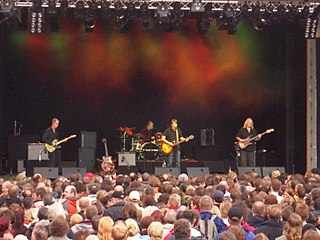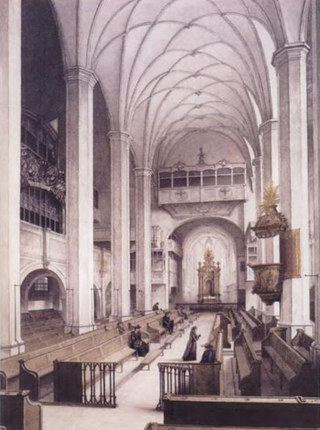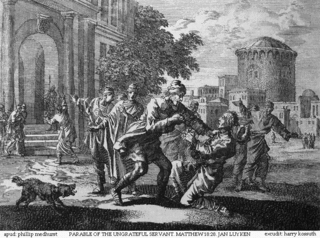| Wo Du hin gehst | |
|---|---|
| Directed by | Martin Hellberg |
| Written by | Eduard Claudius (screenplay and story), Wolfgang Ebeling (dramaturgue), Martin Hellberg |
| Cinematography | Günter Eisinger |
| Edited by | Lieselotte Johl |
| Music by | Ernst Hermann Meyer |
Release date |
|
Running time | 90 minutes |
| Country | East Germany |
| Language | German |
Wo Du hin gehst is an East German film. It was released in 1957.

Johann Sebastian Bach composed the church cantata Wo soll ich fliehen hin, BWV 5, in Leipzig for the 19th Sunday after Trinity and first performed it on 15 October 1724. The chorale cantata is based on the hymn "Wo soll ich fliehen hin" by Johann Heermann.

Ireen Sheer is a German-English singer. She had her first major hit in 1970 with Hey Pleasure Man. She had a top five hit on the German singles chart with "Goodbye Mama" in 1973. She went on to finish fourth at the Eurovision Song Contest 1974 representing Luxembourg, sixth at the Eurovision Song Contest 1978 representing Germany, and thirteenth at the Eurovision Song Contest 1985 representing Luxembourg again.

Element of Crime is a German rock band that plays melancholic chanson, pop and rock music with guitar, bass guitar, drums and voice/trumpet.

Illuminate was a German band from Karlsruhe formed in 1993 by Johannes Berthold.

Ming Tak Estate is a public housing estate in Hang Hau, Tseung Kwan O, New Territories, Hong Kong, near Tseung Kwan O Hospital. It is the fifth public housing estate in Tseung Kwan O and comprises 2 blocks of Harmony I style built in 1996.

The Bartered Bride is a 1932 German musical comedy film directed by Max Ophüls and starring Jarmila Novotná, Otto Wernicke, and Karl Valentin. It is based on the comic opera of the same name by Czech composer Bedřich Smetana. It was shot at the Bavaria Studios in Munich. The film's sets were designed by the art director Erwin Scharf.

"Wo soll ich fliehen hin" is a hymn in seven stanzas by the German Baroque poet, Lutheran minister and hymn-writer Johann Heermann. It was first published in 1630 during the Thirty Years' War. It is a penitential hymn for Lent.

Wo gehest du hin?, BWV 166, is a church cantata by Johann Sebastian Bach for Cantate Sunday, the fourth Sunday after Easter. Bach composed the work as part of his first cantata cycle for Leipzig and first performed it on 7 May 1724.
Bartholomäus Ringwaldt was a German didactic poet and Lutheran pastor. He is most recognized as a hymnwriter.

Hannjo Hasse was an East German actor. Over his nearly four decade career, he was best known for his roles in the films of Lebende Ware (1966) and Walter Defends Sarajevo (1972), as well as the television series Rote Bergsteiger (1968) and Archiv des Todes (1980).
Wenn du gehst is the ninth German single recorded by U. S. entertainer Connie Francis. The B-side was Gondola d'Amore.

Johann Sebastian Bach composed the church cantata Was soll ich aus dir machen, Ephraim, BWV 89, in Leipzig for the 22nd Sunday after Trinity and first performed it on 24 October 1723.

Oliver Alexander Reinhard Petszokat, better known by his stage name Oli.P, is a German singer, actor and television presenter.
Franz Schubert's best-known music for the theatre is his incidental music for Rosamunde. Less successful were his many opera and Singspiel projects. On the other hand, some of his most popular Lieder, like "Gretchen am Spinnrade," were based on texts written for the theatre.
Heinrich Gies (1912–1973) was a German film and television actor.

The Theaterhochschule Leipzig was a theatre school in Leipzig, Saxony, Germany, which existed from 1953 to 1992. The official name was Theaterhochschule "Hans Otto" Leipzig.
"Auf meinen lieben Gott" is a Lutheran hymn from the 17th century. Several hymns are sung to the same hymn tune, including "Wo soll ich fliehen hin", and it was set in compositions. The hymn was translated into English as "In God, My Faithful God". It is part of modern hymnals and songbooks.
Hans-Joachim Büttner (1900–1973) was a German stage and film actor. After the Second World War he appeared in East German films.

Gottfried August Homilius composed Passions for Good Friday services at the Kreuzkirche in Dresden where he was music director (Kreuzkantor) from 1755 to 1785, including oratorios based on the gospels of Matthew and John, Luke and Mark in German. While these works were neglected, their revival began at the Kreuzkirche and led to publications, performances and recordings. Reviewers agree that the compositions in the style of Empfindsamkeit deserve attention.